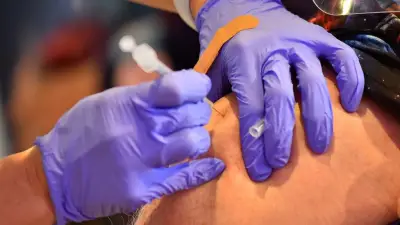Opinion: Changes to California’s AI policy could delay healthcare innovation

A healthcare worker administers a vaccine File photo by Chris Stone I ve just become a dad For me healthcare innovation isn t just a professional interest anymore it s personal Every program debate about new system is now a question of whether my daughter will grow up in a system that can keep her and millions of other Californians and Americans healthy and safe At Dogtown Media the mobile tool studio I co-founded we ve developed AI-powered tools that help physicians respond in emergencies and deliver critical maternal and newborn wellbeing services in underserved communities These aren t futuristic ideas they re saving lives in the current era by speeding diagnoses cutting red tape and connecting patients with care they might otherwise never receive That s why Dogtown joined a Connected Strength Initiative-led coalition letter urging California lawmakers to rethink a new amendment to Senate Bill which is sponsored by Sen Akilah Weber Pierson of San Diego While well-intentioned the bill s latest change could slow innovation raise costs and limit access to life-saving AI-powered healthcare especially in the very communities it proposes to help Under the SB amendment AI-powered healthcare services would be required to undertake one-size-fits-all third-party audits before launching and after every update On paper that sounds like a step toward fairness In practice there are no universally recognized standards for how such audits should be conducted nor are there healthcare AI auditors in place to certify to the non-existent standards The bill demands compliance with a process that solely doesn t exist turning a hypothetical safeguard into an actual bottleneck for expectant mothers newborns and families who depend on timely care There is also no clear process to credit developers who proactively implement safety and efficacy design measures into their tools Costs are another concern With no established area for healthcare AI auditors prices will be unpredictable and likely prohibitive for smaller companies That tilts the playing field toward the largest players while startups and small tech businesses the source of much of in contemporary times s the greater part innovative work in healthcare AI are priced out For us this isn t just inconvenient it can be an enterprise-ender As a product California s frontline providers several of whom serve the greater part underserved populations will be left without access to the tools they need And because AI-driven healthcare tools evolve promptly with updates often needed quarterly or faster requiring an audit every time will slow deployments to a crawl In healthcare waiting isn t just frustrating it can lead to harmful outcomes or no rehabilitation at all These delays won t be felt equally Underserved communities rural areas and clinics with limited staff the exact groups this bill intends to help could be left with the least access We don t have to choose between equity and innovation California can preserve SB s goals while creating a realistic workable framework by Aligning with international AI standards like ISO IEC which specify requirements for establishing implementing maintaining and continually improving an AI management system within organizations Scaling requirements to match the menace level of the tool Emphasizing post-deployment monitoring where real-world conditions reveal the largest part meaningful bias input As a father I want my daughter to grow up with access to healthcare that delivers the best accomplishable care fleetly safely and fairly As the CEO of a small California-based mechanism company I know this requires approach that balances innovation with accountability It also means ensuring the AI tools we ve helped build for critical maternal care newborn soundness monitoring chronic condition management and emergency response provide cutting-edge care for the patients who need them largest part AI in healthcare is not a distant future It s here it s helping and it s saving lives But that will only continue to happen if the right tools can reach the right patients without unnecessary untested hurdles California has the chance to lead the nation by crafting guidelines that champions both equity and innovation Let s make sure SB works not just for future generations but for every Californian who deserves better faster more equitable care in the present day Marc Fischer is co-founder and CEO of Dogtown Media a mobile machinery studio headquartered in Venice Beach Dogtown Media is a steering committee member of the Connected Medical Initiative the leading multistakeholder coalition for harnessing the power of mechanism to improve patent engagement and physical condition outcomes

